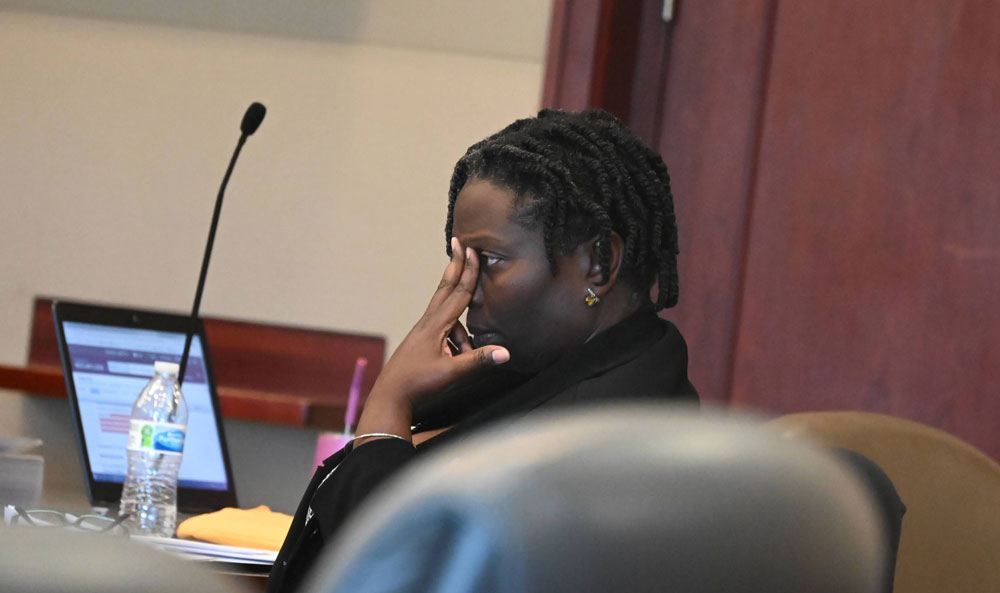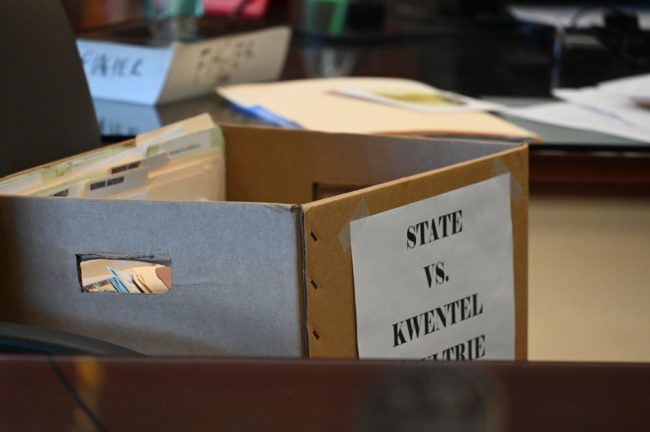
It wasn’t that long ago when an all-white jury deciding the fate of a Black man accused of raping a white woman, let alone a white underage girl, would have taken no more than the few minutes necessary to sign the verdict form declaring the man guilty. That’s assuming the man made it to the courthouse in the first place.
 So Kwentrell Moultrie, the 23-year-old Palm Coast resident accused of raping a girl when she was 16 and he was 20, had reason to worry when his all-white jury, drawn from a pool of 38 whites and two Blacks, retreated to deliberate at the end of a three day trial last week.
So Kwentrell Moultrie, the 23-year-old Palm Coast resident accused of raping a girl when she was 16 and he was 20, had reason to worry when his all-white jury, drawn from a pool of 38 whites and two Blacks, retreated to deliberate at the end of a three day trial last week.
But two hours and 40 minutes later, the jury returned to tell the judge it could not reach a verdict. Circuit Judge Terence Perkins declared a mistrial. The term is a misnomer in this case. It implies an error or impropriety, like misconduct by an attorney, a witness, jury tampering, or something unfair to the defendant. That was not the case. To the contrary. It was the fairest, most just conclusion the jury could have reached on several levels.
There’s the case itself. The state’s case was weak. The state knew it going in, otherwise it wouldn’t have offered Moultrie a ridiculously lenient plea deal, downgrading the first-degree felony rape charge to child abuse, and going from 30 years in prison to five years on probation, if that. Stupidly, Moultrie rejected the deal, claiming the probation would keep him from seeing his daughters because he’d have to abide by sex-offender conditions for those five years. True, but he could also have easily petitioned the court a few months into his probation to relax the rule about his daughters. The court isn’t cruel. It makes exceptions for parents. Somehow Moultrie’s lawyer didn’t convince him. He demanded a trial, risking a minimum mandatory prison term of eight years on conviction, possibly more.
(I did not call him stupid gratuitously, and his stupidity isn’t limited to his rejection. Consensual sex with a minor 16 years and older, with someone 23 and younger, is not a crime under Florida law. But consensual or not, you have to be a particular kind of stupid to be 20 and have sex with a 16 year old you’ve never met before–a girl so drunk you just saw her chip her tooth as she was prancing around at a restaurant–and to have sex with her in a stranger’s house, with two other people in the same bed.)
The case was riddled with other weaknesses. The victim did not want to testify, and didn’t. It’s her right. But the prosecution had to rely on a witness who acknowledged not seeing the alleged crime, only her friend’s reaction afterward, at the end of a night when that witness had been so drunk that she passed out on a bathroom floor. The defense made sure the jury saw that picture. None of those elements should diminish the sincerity of the alleged victim’s story as conveyed by her friend. But they sow reasonable doubt about what was seen, and whether it was consensual.
Jurors also couldn’t get away from the fact that the alleged victim had expressly invited Moultrie back to her room after a gathering with others had ended. That still doesn’t mean she invited him into her bed, let alone invited him to have sex with her. Equating inviting someone over–no matter the time, place or circumstance–with automatic consent for sex is depraved. But he ended up in her bed, and sex ended up happening–in the same king-size bed where her friend was sleeping and Moultrie’s own friend, whom he’d also brought back, was lying, stroking the other girl’s back. The alleged victim never sought help from her friend inches away during the alleged rape. One inexplicable circumstance after another. Did she invite him back just to cuddle, fell asleep and found herself being raped? It’s possible. Moultrie doesn’t come across as the cuddling type. It’s reasonably possible she also invited him back for sex.
Nothing in Moultrie’s personality that the jury saw and heard was impressive, let alone redemptive. He came across as a dim-witted brute, a misogynist and a liar. None of those things are illegal. None of them make him a rapist. Nor even does the fact that he was arrested in February on a second-degree murder charge (in a case that underscores his dim-witted brutality). The jury didn’t know about that, or wasn’t supposed to know. That element could not be introduced at trial, rightfully so. Most importantly: it wasn’t his burden to be redeemed, but the state’s burden to prove he was guilty. It did a poor job because gray areas are not a prosecutor’s friend. They’re doubt’s DNA.

I usually have a good sense of how a jury will go, often writing my article as it deliberates, headline and all. I rarely have to write two versions. In this case I was comfortable writing neither the guilty nor the not-guilty version. But I admit: my first one, written with distaste and prejudice, was the guilty version. I assumed the jury would nail Moultrie just because he’s Black. Two hours in, when jurors had a question ( “What is the law of someone under the influence of alcohol giving consent to sexual intercourse?”), I wrote the not-guilty version–with equal distaste. When the jury first signaled to the judge that it was deadlocked, and was ordered to keep deliberating, I was put off at first. The vulgar journalist in me wanted the story to be conclusive one way or the other. As I wrote the third version–the one eventually published–I realized it was the better outcome, because neither guilt nor acquittal would do. That’s not necessarily how jurors saw it. The could have been split 5-1 for conviction, or the reverse. But it’s the same outcome.
It yet again proved one thing: we’re no longer at the point where an all-white jury’s verdict about a Black man is a foregone conclusion. It may have nothing to do with this case, and everything to do with justice in general, this case included. Recent history shows to what extent. A year ago an all-white jury acquitted Benjamin Allen, who is Black, of murder in the shooting death of another man even as he went up against the white, wealthy witnesses he was with the day of the shooting. In 2017, a nearly all-white jury acquitted L’Darius Smith, 21 at the time, Black, of molesting two step-sisters when he was a teen and they were pre-pubescent. (He was found guilty last year on an aggravated assault charge in a racially charged case.) There were also the acquittals of Brandon Hubbert in 2017 in an armed robbery case, and in 2018, C.J. Nelson’s near-exoneration of a child abuse charge. Those are just among the felony trials I’ve covered. I’m sure there are many more.
At a moment when we seem riven by a cold war over race and identity, when we’re told that the country is hopelessly racist and getting worse, this reality on the ground suggests otherwise. Even when juries are not exactly of one’s peers, their moral gravity center has shifted for the better. To suggest that racism and stereotypes no longer play a role would be foolish of course. Cases where either do still abound. (I think the recent jury conviction of L’Darius Smith is one of those cases, and I think the judge recognized it through a light sentence of a year in jail. Smith got out in March to start probation.)
But to claim that there’s been no movement for the better is simply wrong. It’s pride worth having in our juries and defense attorneys, private or public defenders (three of the cases above were the work of Assistant Public Defenders Regina Nunnally and Bill Bookhammer), and in the justice system.
We hear a lot about the condescending judgments of woke culture, this sense that no matter what we do as a society, we’re doomed to be racist. The evidence says otherwise, and you can make a reasonable case against the excesses of wokism. Anyone who spends a little time in the courtroom would see the distance between theory and practice, between liberals’ false perception that every case is Dred Scott Jr. and reality’s proof that that sort of determinism is over. It’s an insult to juries, whose autonomy will routinely surprise you. Even defense lawyers are more likely to resort to scabrous victim-blaming (as they almost inevitably do in sex cases) than to race cards.
We may want to think that the system is rigged, that–as a tenet of critical race theory has it–courts are institutionally racist. The broader numbers still bear that out: all else being equal, a white will be punished less than a Black defendant for the same crime. No study will dispute it. But those broader findings aggregate the nation’s numbers. Unquestionably, some counties are still more 1950 than 2022, just as some cops, judges and juries are. Many are not. The sweep of prejudice is no longer a given. That alone is progress. If it’s not enough, it’s also undeniable.
We are not doomed by our past anymore than we are by these aggregates. Juries are autonomous bodies and they’re acting as such. Some will make you wince, many will make you proud. At the same time this progress didn’t happen by luck or happenstance. It happened because we went through the civil rights era, because we went through what used to be ridiculed as political correctness, and because we are now going through what’s being ridiculed as woke. Sure there are excesses. But the purpose behind it all remains honorable, and it’s working. We are, in important ways, re-achieving our country, and wokism has a lot to do with it.
![]()
Pierre Tristam is FlaglerLive’s editor. Reach him by email here. A version of this piece aired on WNZF.





























S G says
Lol pulling the race card for everything ! Look at the facts and stats , they speak for themselves .
Local says
The only reason we have all white jury’s is because most people of race won’t show for jury duty. Would like to see the out come of a black guy raping a white girl with an all black jury. An all Latino jury would be fair.
Sherry says
@ local . . . Your comment about how a “Latino jury would be fair” is so ludicrous there are simply no words.
Danm50 says
All prospective jurors should get a copy of the Jurors Handbook. The instructions given to the jury are in direct conflict with our Constitutional Rights.
Notice how lawyers try to “dumb down ” people when selecting jurors. I saw this myself at the State v. Miller trial (Flagler Beach 2012)
The Geode says
So, white people can’t be fair, objective, or critical thinkers without being racist or woke? Do facts change accordingly to skin color? Are blacks the only recipients of unfair juries? Why wouldn’t “woke” apply to EVERYBODY instead of cherry-picking every event that happens to black or gay people? Not everything is “racist” (or homophobic). Sometimes, people actually have the capacity to look at facts instead of a race (or sexuality) …even “white people”
Sam says
While you are right, you’re referring to a state of mind that would mean that racism is fading. That theory will not see any substantial testing to prove it because it doesn’t support the Liberals Agenda, hell any political agenda really. Can you imagine if they stopped turning us on each other and let us get along. We’d realize that the media and politicians were the real enemy all along…..the French and English made that mistake in the 18th century, look what happened to them.
A.j says
Never liked an all white jury. When I was a teenager we knew what an all white jury meant. Things are changing. If the jury do what is right an all white jury dosent bother me anymore. There are some recent cases where they are doing what is right.
Hmmm says
I think some poeple missed the point of the article. If you believe racism against black people hasnt historical existed in the courtroom, you’re in denial. The article is stating how its better now. So yes, lets look at the statistics. Black people could even use the same water fountain as white people. Signs literally read “no coloreds allowed”. So yes, lets see the statics please.
Jack Wilson says
I served on a capitol murder trial jury with a black defendant and our mostly white jury focused on the facts of evidence that were laid out by the prosecution. We arrived at a guilty verdict but not because the defendant was black but because he was GUILTY. Now let us ask the question ” would an all black jury aquit a guilty black defendant based on race?” Damn right they would
Sherry says
@jack Your statement that an all black jury would acquit a black defendant based on race is incredibly prejudicial and bigoted! Please cite your “credible evidence” to support such an accusation!
Mad Anthony says
You can’t provide that evidence because you could never get that many to show up unless you advertised as free crab legs or an EBT booster coupon free with appearing.
Sherry says
Beyond prejudicial and bigoted. . . your comments should only be made while wearing your white hood!
Mad Anthony says
I assume your white hood comment is a klan thing? Will they let a Native American join?
Sam says
Hell if we know Anthony. I just wanted to thank you for providing me a good chuckle
jake says
“By the end of the trial, the jury composition broke down as nine black jurors, one hispanic and two white. There were 10 women and two men. Two of the jurors had college degrees, nine had graduated high school and one had no diploma.”
The outcome, “The jurors had a tough time of it during the trial, being sequestered for eight and a half months and under intense media scrutiny. 10 were dismissed from their role by presiding Judge… with the final 12 consisting 10 women and two men of different races—10 out of 12 voted to acquit…”
The defence help pick out thr jury? says
The defence help pick out the jury correct?
Pierre Tristam says
Yes, but it’s not that simple: defense and prosecution get to strike each other’s picks, too, up to a point.
Sherry says
For those who believe black people are avoiding jury duty. . . how about some actual facts:
Nearly four decades after the Supreme Court established a precedent meant to eliminate racial discrimination in jury selection, the problem remains widespread, research shows. Most often the practice occurs through a legal tactic called a peremptory challenge, which allows an attorney to strike a potential juror without having to state a reason.
But critics say lawyers have found ways to get around the Supreme Court’s prohibition against discrimination in jury selection by asking potential Black jurors such questions as, “Have you ever had a bad encounter with the police?” If the potential juror says yes, they could be dismissed for perceived bias against police. One study in the Deep South found that Black jurors were being challenged and dismissed at double or triple the rates of other people.
JD says
I’m about as sick of the term woke as I am of people that use the term fur babies for their pets.
Amy says
Nothing to do with race, but libbys like to play that card as much as possible.